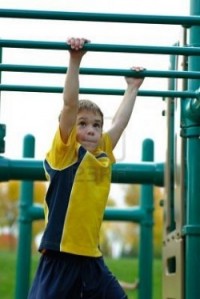Kids and Weight Training
November 23, 2011 by danny · 5 Comments
When should my child begin weight training? I get this question from parents all the time. My answer to the question has more to do with mental maturity than it does physical maturity. In other words (with the proper supervision and coaching), from a physical maturity standpoint, I do NOT think an 8 or 9 year old is too young to start weight training. Legend Mel Siff, in his book, Facts & Fallacies in Fitness states that, “stresses imposed on the body by common sporting activities such as running, jumping and hitting generally are far larger (by as much as 300%) than those imposed by Powerlifting or Olympic Lifting.”
Running up and down the basketball court, soccer field, baseball field, or jumping off of the monkey bars at recess is WAAAY harder on the body than lifting weights!
And then you add to the fact that the goal of weight lifting for kids is not to test his or her 1 RM (Rep Max). If set up properly, the coach/trainer will start kids off in the weight room with the goal of “building a foundation,” to teach them proper form. When the kid reaches high school, (s)he will be well equipped to start adding weight to the bar. When I work with kids, my goal is to improve their movement quality, teach proper form, and help make it fun for them so they develop a passion for working out the rest of their life.
Movement Quality – Over the years this has gotten worse and worse with today’s youth. They spend too much time sitting on their rears. The increase in video games and tv has contributed to kids moving poorly.
Form/Technique/Cues – When kids get to hear cues from the coach like, “tuck your elbows” while doing push-ups, or, “drive through your heels,” when doing lunges, it sets them up for success when it comes time to add some weight to the bar.
Machines Are Safer Than Free Weight For Kids
Some people believe machines to be safer for kids than free weights (your own body weight, barbells, and dumbbells) due to the static nature (and fixed position) of machines. I do NOT believe this to be true. To me, this would be like giving kids a calculator in first grade and telling them to just “use this and don’t worry about learning to add and subtract.” In sports (and in life), kids need to learn how to control their bodies through space. Dynamic warm-ups and free weight/body weight exercises are great to help youngsters prepare for “real world” activities.
Mental Maturity
As I mentioned above, this is what truly tells us when a kid is ready to start weight training. I’ve had parents send their young kids to me, and while I’m explaining what we are about to go over, they are more interested in following the butterfly floating around outside the window. I can just “feel” that the ONLY reason the kid is in the gym training with me, is because mom or dad made him/her go. If this is the case, I suggest to the parents that at this time, they should simply encourage their kids to be active… go out and play catch with them; take them to the pool to swim; play tag with friends; go to the park and have them run around the playground, etc etc.
Summary: If you’re worried that your kid is not physically mature enough to start lifting weights, stop worrying. If designed and coached properly, this is not an issue.
However, if your kid shows no interest in weight training, don’t worry about it. At this point, just running around and “playing” is all they really need. Encourage an active life and focus on making movement fun for them.
Lifting With The Youngsters
Yesterday, Carson had a friend over (Britton) and they joined me for a lift down in my basement. Carson has now lifted with me a number of times, and this is Britton’s second time. As I mentioned above, we focused on free weight lifts, form, movement quality, and having fun. I caught the majority of our training session on tape…
Good Times!
If you had been wondering when to get your son or daughter involved with weights, now you know. Feel free to forward this on to your friends that also have kids. This information can be very beneficial to them. After all, I’d hate to have a kid miss the opportunity to improve their health and physique because mom or dad thought that weight training was bad for them.
In the comments section, let me know if you have any thoughts or questions.
Have a great Thanksgiving, but be sure to get right back on track with your eating the next day!












Great advice Danny! As a high school football coach for 10 years, I would say over 95% of the kids that came in as freshmen didn’t know how to do a pushup or a bodyweight squat properly. They feel intimidated by a weight room and embarrassed that they can barely lift the bar. It’s so important to make kids feel comfortable training. One bad experience can drive a kid away from the weight room and ultimately the sport they love to play.
With high school sports becoming so specialized, kids can’t afford not to learn proper training techniques. Getting an early start on basic fitness is critical. With many schools cutting back on P.E. kids aren’t getting physical activity on a daily basis, let alone learning about the importance of fitness. It’s never too early to teach kids how important it is to stay active.
Thanks again for the wonderful advice.
Well said, Steve!
And I agree, the “basics” are not so basic with many high schoolers… the inability to perform a full ROM of push-up, squat, lunge, etc. Sad!
Danny
I agree with your entire essay – many 8-12 year old are ready and eager to do some weight training. Starting with lunges, pushups and squats and moving into use weights are good for them. With children, endurance and body control are the goals.
I also think children should stay off machines- for the same reason that many women should. Although the engineering has improved lately, machines are still mainly designed to be efficient if you fall into the 5′7″-6′3″ range. For those much smaller, the machines simply do not work well.
Great points, Danny. If I may add to the article, I would also like to point out that machine based training, while perceived as “safer” can actually be very detrimental to the joints themselves. As an example, a 6′6 basketball player and a 5′3 wrestler, have no business trying to use the same bench press machine that FORCES the SAME movement pattern. The pattern is FIXED. Even though seates can be adjusted, the dictated movement patterns could potentially be more harmful, especially to the shoulder. The only machines I would say are okay are those that are truely cable based and allow for a free ROM. Furthermore, when kids are growing and lifting, fixed machines can actually start to develop faulty movement patterns. So by this example, free weights, if proper form is taught, would allow each ahtlete to move in their own proper/comfortable range of motion. Yet, without a doubt, bodyweight training is of the utmost importance in the progression of teaching young athletes. Good stuff buddy!!!
Thanks, V!
Great comments!